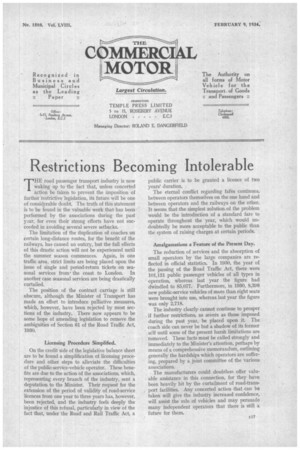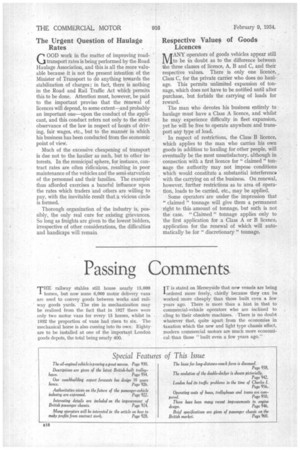Restrictions Becoming Intolerable
Page 75

Page 76

If you've noticed an error in this article please click here to report it so we can fix it.
THE road passenger transport industry is now waking up to the fact that, unless concerted action be taken to prevent the imposition of further restrictive legislation, its future will be one of considerable doubt." The truth of this statement is to be found in the valuable work that has been performed by the associations during the past year, for even their strong efforts have not succeeded in avoiding several severe setbacks.
The limitation of the duplication of coaches on certain long-distance routes, for the benefit of the railways, has caused an outcry, but the full effects of this drastic action will not be experienced until the summer season commences. Again, in one traffic area, strict limits are being placed upon the issue of single and period-return tickets on seasonal services from—the coast to London. In another case seasonal services are being drastically curtailed.
The position of the contract carriage is still obscure, although the Minister of Transport has made an effort to introduce palliative measures, which, however, have been rejected by most sections of the industry. There now appears to be some hope of amending legislation to remove the ambiguities of Section 61 of the Road Traffic Act, 1930.
Licensing Procedure Simplified.
On the credit side of the legislative balance sheet are to be found a simplification of licensing procedure and other steps to alleviate the difficulties of the public-service-vehicle operator. These benefits are due to the action of the associations, which, representing every branch of the industry, sent a deputation to the Minister. Their request for the extension of the period of validity of road-service licences from one year to three years has, however, been rejected, and the industry feels deeply the injustice of this refusal, particularly in view of the fact that, under the Road and Rail Traffic Act, a public carrier is to be granted a licence of two years' duration. • The eternal conffict regarding fafes continues, between operators themselves on the one hand and between operators and the railways on the other. It seems that the simplest solution. of the problem would be the introduction of a standard fare to operate throughout the year, which would undoubtedly be more acceptable to the public than the system of raising charges at certain periods.
Amalgamations a Feature of the Present Day.
The reduction of services and the absorption of small operators by the large companies are reflected in official statistics. In 1930, the year of the passing of the Road Traffic Act, there were 101,131 public passenger vehicles of all types in operation, whereas last year the figure had dwindled to 85,077. Furthermore, in 1930, 8,398 new public7service vehicles of more than eight seats were brought into use, whereas last year the figure was only 2,718. The industry clearly cannot continue to prosper if further restrictions, as severe as those imposed during the past year, be placed upon it. The coach side can never be but a shadow of its former self until some of the present harsh limitations are removed. These facts must be called strongly and immediately to the Minister's attention, perhaps by means of a comprehensive memorandum, outlining generally the hardships which operators are suffering, prepared by a joint committee of the various associations.
The manufacturers could doubtless offer valuable assistance in this connection, for they have been heavily hit by the curtailment of road-transport facilities. Any concerted action that can be taken will give the industry increased confidence, will assist the sale of vehicles and may persuade many independent operators that there is still a future for them.
The Urgent Question of Haulage Rates
OOD work in the matter of improving road transport rates is being performed by the Road Haulage Association, and this is all the more valuable because it is not the present intention of the Minister of Transport to do anything towards the stabilization of charges; in fact, there is nothing in the Road and Rail Traffic Act which permits this to be done. Attention must, however, be paid to the important proviso that the renewal of licences will depend, to some extent—and probably an important one—upon the conduct of the applicant, and this conduct refers not only to the strict observance of the law in respect of hours of driving, fair wages, etc., but to the manner in which his business has been conducted from the economic point of view.
Much of the excessive cheapening of transport is due not to the haulier as such, but to othcr interests. In the municipal sphere, for instance, contract rates are often ridiculous, resulting in poor maintenance of the vehicles and the semi-starvation of the personnel and their families. The example thus afforded exercises a baneful influence upon the rates which traders and others are willing to pay, with the inevitable result that a vicious circle is formed.
Thorough organization of the industry is, possibly, the only real cure for existing grievances. So long as freights are given to the lowest bidders, irrespective of other considerations, the difficulties and handicaps will remain
Respective Value of Goods Licences
NANY operators of goods vehicles appear still WIto be in doubt as to the difference between the three classes of licence, A, B and C, and their respective values. There is only one licence, Class C, for the private carrier who does no haulage. This permits unlimited expansion of tonnage, which does not have to be notified until after purchase, but forbids the carrying of loads for reward.
The man who devotes his business entirely to haulage must have a Class A licence, and whilst he may experience difficulty in fleet expansion, yet he will be free to operate anywhere and transport any type of load.
In respect of restrictions, the Class B licence, which applies to the man who carries his own goods in addition to hauling for other people, will eventually be the most unsatisfactory, although in connection with a first licence for " claimed " tonnage the authority may not impose conditions which would constitute a substantial interference with the carrying on of the business. On renewal, however, further restrictions as to area of operation, loads to be carried, etc., may be applied.
Some operators are under the impression that " claimed " tonnage will give them a permanent right to this amount of tonnage, but slid' is not the case. " Claimed " tonnage applies only to the first application for a Class A or B licence, application for the renewal of which will automatically be for " discretionary " tonnage.




































































































































































